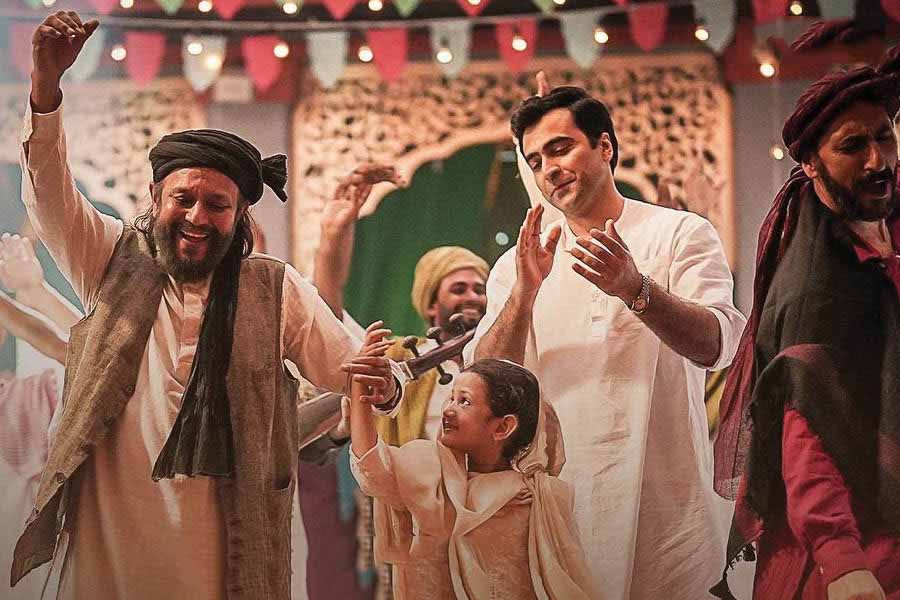Twelve years after Nobel Chor, director Suman Ghosh and Mithun Chakraborty got back together to make Kabuliwala, based on the short story by Rabindranath Tagore. Ahead of the film’s release on December 22, Suman spoke to us about being inspired by Tapan Sinha’s 1950 film and casting Mithun as a kabuliwala.
When was it that you decided to adapt Kabuliwala on screen?
Suman Ghosh: I decided to adapt Kabuliwala five-six years back. There were two reasons. The first one was personal. I have two daughters, Maya and Leela, who are now 11 and nine. Five years back, they were the age that Mini is in Kabuliwala. After becoming a father, this story had a different impact on my perspective towards life. And I also felt that it was a celebration of Rabindranath Tagore’s story. Humanity is Tagore’s main philosophy.
The world today is full of turmoil and anger, divided by countries, culture, religion and language, and the story that Tagore had written in 1892 is still so relevant. The friendship between a much older person — who comes from a different country, religion, culture and language — and a five-year-old Bengali girl is a comment in itself. True love transcends barriers of identities we impose on ourselves. There was this socio-political reason, too, why I thought this film should be remade in the current scenario.
Can you take us through the process of the book to screen adaptation?
Suman Ghosh: Though the short story is there, there is the classic film that Tapan Sinha made in 1950 for reference. We have added a lot of other elements to the film. The process was not difficult. My only concern was to retain the core of the story. As I was adapting one of the most famous and important stories of Tagore, I was very conscious of the fact that it needed to be done responsibly. The main structure should be the same as the story.
What references did you take from Tapan Sinha’s film?
Suman Ghosh: Every Bengali has seen Tapan Sinha’s Kabuliwala while growing up. A lot of my non-Bengali friends told me that they know Tagore because of Kabuliwala. Tapan Sinha’s film was ingrained in us in our childhood, like Sonar Kella. His film was always on my mind, subconsciously. I haven’t seen the film in the last three-four years. I didn’t want to be too influenced, though I do remember the whole film. The period shown in my film is 1965. After seeing the film, people will understand why I chose this specific time frame.
Where did you shoot the film?
Suman Ghosh: The desert scenes were shot in Kargil. For the other part of the film, we created a colony on set. It is very difficult to make a period film as the city has changed completely. I was quite aware of the budget constraints. Art director Tanmoy Chakraborty has done a beautiful job.
You had mentioned earlier that you were determined to make Kabuliwala with Mithun Chakraborty…
Suman Ghosh: I don’t see any other options. It is inexplicable why Mithunda (Mithun Chakraborty) was on my mind. I see Kabuliwala in him. Rahmat is a Hindi-speaking guy who also speaks Bengali. Mithunda is someone who has made his name in Bollywood and his Hindi is so good. As an actor, he is unparalleled.
I researched a lot while writing the script. I spent time with kabuliwalas to understand how they speak. I thought of keeping a dialect coach for Mithunda to get that accent. The moment I started talking to him about the role, he would enact the dialogues for me. He got the accent perfectly. Then he told me about a guy called Jamal who he had stayed with in Bombay during his struggling days as an actor. Jamal was from Afghanistan and he became a very good friend of Mithunda’s. Jamal came to Mithunda’s mind when he heard about Rahmat. Kabuliwala is Mithunda’s tribute to Jamal. He said he doesn’t know if Jamal is still alive but he wants to dedicate this film to him.
How did you go about casting Anumegha Kahali as Mini, and Abir Chtterjee and Sohini Sarkar as her parents?
Suman Ghosh: Mithunda and I had discussed the issue that if whoever we take didn’t live up to the role of Mini, the film would fall flat. It is the bond between Rahmat and Mini which is the heart of Kabuliwala. We auditioned many little girls. I just saw the spark in this little girl, Anumegha. She’s very intelligent.
Abir’s character is the liberal voice we are missing these days. He embraces a person from a different background. Abir has a ‘bhadrolok’ image, which I thought would be perfect as Mini’s father. SVF helped me in casting Sohini Sarkar as Mini’s mother. Working with Sohini has been such a delight.
While shooting for Kabuliwala with Mithun Chakraborty, did memories of Nobel Chor come rushing back ?
Suman Ghosh: We shot Noble Chor twelve years back. When we were doing Noble Chor, I was in awe of Mithun Chakraborty. After Nobel Chor, I realised how relationships become personal. There was a personal connection between us that helped in Kabuliwala. Mithun Chakraborty prepared for almost eight months to play Rahmat. Because we understand each other so well, I think it helped in developing the character of Rahmat.
Any other works of Tagore that you would like to adapt?
Suman Ghosh: If I were to adapt something in my own way, I would pick Gora. It is a very relevant topic in today’s environment. I find it to be a very striking novel.
What is next?
Suman Ghosh: We have started shooting for Puratawn with Sharmila Tagore.











